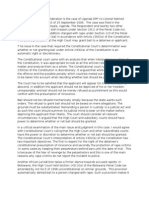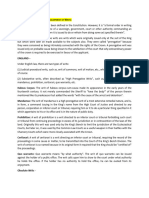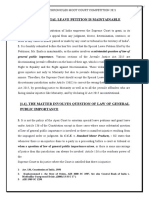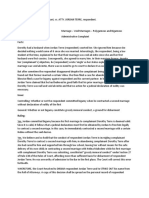P.S.R. Sadhanantham v. Arunachalam and Anr Article 21: Useless
P.S.R. Sadhanantham v. Arunachalam and Anr Article 21: Useless
Uploaded by
Harsh GuptaCopyright:
Available Formats
P.S.R. Sadhanantham v. Arunachalam and Anr Article 21: Useless
P.S.R. Sadhanantham v. Arunachalam and Anr Article 21: Useless
Uploaded by
Harsh GuptaOriginal Description:
Original Title
Copyright
Available Formats
Share this document
Did you find this document useful?
Is this content inappropriate?
Copyright:
Available Formats
P.S.R. Sadhanantham v. Arunachalam and Anr Article 21: Useless
P.S.R. Sadhanantham v. Arunachalam and Anr Article 21: Useless
Uploaded by
Harsh GuptaCopyright:
Available Formats
Useless
P.S.R. Sadhanantham v. Arunachalam and Anr.
Article 21, in its sublime brevity, guardians human liberty by insisting on the prescription of
procedure established by law, not fiat as sine qua non for deprivation of personal freedom.
And those procedures so established must be fair, not fanciful, nor formal nor flimsy, as laid
down in Maneka Gandhi's case. So, it is axiomatic that our constitutional jurisprudence
mandates the State not to deprive a person of his personal liberty without adherence to fair
procedure laid down by law.
It is apparent that there is no statutory provision which creates a right of appeal in favour of
a stranger enabling him to challenge an acquittal by the High Court. The Criminal Procedure
Code does not create such a right of appeal and, speaking generally, a right of appeal is the
creature of statute. So it is submitted that before the court may grant special leave
under Art. 136 there must be an antecedent right of appeal, absent which the question of
leave by the court does not arise.
The discretionary dimension is considerable but that relates to the power of the court. The
question is whether it spells by implication, a fair procedure as contemplated by Art. 21. In
our view, it does. Article 136 is a special jurisdiction. It is residuary power; it is extra
ordinary in its amplitude, its limit, when it chases injustice, in the sky itself.
It is fair to assume that while considering the petition under Art. 136 the court will pay
attention to the question of liberty, the person who seeks such leave from the court, his
motive and his locus standi and the weighty factors which persuade the court to grant
special leave. When this conspectus of processual circumstances and criteria play upon the
jurisdiction of the court under Art. 136, it is reasonable to conclude that the desideratum of
fair procedure implied in Art. 21 is adequately answered.
the bogey of busybodies blackmailing adversaries through frivolous invocation of Art.136 is
chimerical.
petioner
Even the English System, as pointed by the Discussion paper, permits a private citizen to file
an indictment. In our view, the narrow limits set, in vintage English law, into the concept of
'person aggrieved' and 'standing' needs liberalisation in our democratic situation. In
Dabholkar's case this court imparted such a wider meaning. The American Supreme Court
relaxed the restrictive attitude towards 'standing' in the famous case of Baker v. Carr. Lord
Denning, in the notable case of the Attorney-General of the Gambia v. Pierra Sarr N' Jie, spoke
thus:
....the words 'person aggrieved' are of wide import and should not be subjected to a restrictive
interpretation. They do not include, of course, a mere busybody who is interfering in things
which do not concern him;
PATHAK, J: The High Court of Madras in its appellate jurisdiction acquitted the petitioner,
Sadhanantham, of charges under s. 302 and s. 148, I.P.C. Arunachalam, a brother of the
deceased, petitioned to this Court under Article 136 of the Constitution for special leave to
appeal against the acquittal. The court granted special leave, and ultimately allowed the
appeal, Arunachalam v. P.S.R. Sadhanantham, and setting aside the judgment of the High
Court restored the conviction and sentence imposed by the trial court under s. 302, I.P.C. The
petitioner has filed this writ petition contending that the judgment and order of this Court is a
nullity and should be set aside. The principal contention is that Article 136 did not empower
this Court to grant special leave to Arunachalam (the third respondent) and the grant of special
leave by the Court and its entertaining the appeal violates Article 21 of the Constitution.
The maintainability of the appeal on the ground that Arunachalam was not entitled to petition
under Article 136 of the Constitution for special leave was challenged before the Bench
hearing the appeal, but the Bench over-ruled the objection holding that it had ample power
under Article 136 to entertain the special leave petition. The learned Judges laid down that the
Court had jurisdiction to entertain appeals against judgments of acquittal by the High Court at
the instance of private parties.
We have read the judgment of our learned brother V. R. Krishna Iyer, but because of the
importance of the question we consider it necessary to set down our own view
You might also like
- Law Notes (LL.B Notes) - Constitutional Law-2Document41 pagesLaw Notes (LL.B Notes) - Constitutional Law-2balaji100% (3)
- Torts Rule StatementsDocument40 pagesTorts Rule Statementskoreanman100% (1)
- Administrative Law in Tanzania. A Digest of CasesFrom EverandAdministrative Law in Tanzania. A Digest of CasesRating: 4.5 out of 5 stars4.5/5 (12)
- Junsan Case Comments Opposition To Motion For ReconsiderationDocument3 pagesJunsan Case Comments Opposition To Motion For Reconsiderationpopoy cayoneNo ratings yet
- Writing SampleDocument3 pagesWriting SampleBishnoi HarshNo ratings yet
- Writing SampleDocument3 pagesWriting SampleBishnoi HarshNo ratings yet
- Can Supreme Court Rules Violate Fundamental Rights?: by It in Pursuance of Its Rule-Making PowerDocument6 pagesCan Supreme Court Rules Violate Fundamental Rights?: by It in Pursuance of Its Rule-Making PowerdivyarajsinhNo ratings yet
- Judiciary As A State Under Article 12Document3 pagesJudiciary As A State Under Article 12ADITYA G 1650102100% (1)
- 136 FinalDocument20 pages136 FinalChandra Sai KumarNo ratings yet
- Complainant Has The Locus To File An Appeal Case in This MatterDocument9 pagesComplainant Has The Locus To File An Appeal Case in This MatterPriyanjali SinghNo ratings yet
- A. That Petitioner Is Having Locus StandiDocument2 pagesA. That Petitioner Is Having Locus StandiSugandha KaulNo ratings yet
- Committal Proceedings Contrary To Fair TrialDocument15 pagesCommittal Proceedings Contrary To Fair TrialChloeNo ratings yet
- Redress CasenoteDocument13 pagesRedress CasenoteJade MontroseNo ratings yet
- Constitution Law2Document50 pagesConstitution Law2NARINDERNo ratings yet
- Admin Project - Curative Petition.Document15 pagesAdmin Project - Curative Petition.Siddharth BadkulNo ratings yet
- Supreme Court of India Page 1 of 34Document34 pagesSupreme Court of India Page 1 of 34Devesh SawantNo ratings yet
- (1.1) Power Under Article 32 of The ConstitutionDocument6 pages(1.1) Power Under Article 32 of The ConstitutionShravan AdityaNo ratings yet
- De Guzman vs. PeopleDocument4 pagesDe Guzman vs. PeopleRalph Mark JosephNo ratings yet
- Maintainability PetitionerDocument5 pagesMaintainability PetitionerturrrrNo ratings yet
- Criminal Appeals: Elevated To Hon'ble High Court Subsequent To Publication of This ArticleDocument6 pagesCriminal Appeals: Elevated To Hon'ble High Court Subsequent To Publication of This ArticleHarsh Vardhan Singh HvsNo ratings yet
- Raman Bhai Consti SLPDocument18 pagesRaman Bhai Consti SLPSejal LahotiNo ratings yet
- Chapter 4Document129 pagesChapter 4Dinesh Kumar GargNo ratings yet
- Memo Petitioner SideDocument10 pagesMemo Petitioner SideGANGA JAYADEEPNo ratings yet
- Case Study 2Document30 pagesCase Study 2Narasimha Murthy H NNo ratings yet
- Jurisdiction of Supreme CourtDocument3 pagesJurisdiction of Supreme CourtMohd ShajiNo ratings yet
- Admin Law-CasesDocument6 pagesAdmin Law-CasesRavindran PonnusamyNo ratings yet
- Seminar 05.11.2023Document13 pagesSeminar 05.11.2023Shashwat DubeyNo ratings yet
- Mangila vs. Pangilinan PDFDocument8 pagesMangila vs. Pangilinan PDFHannah MedesNo ratings yet
- Sir Chunilal V. Mehta & Sons Ltd. vs. Century Spinning and Manufacturing Co. Ltd.Document10 pagesSir Chunilal V. Mehta & Sons Ltd. vs. Century Spinning and Manufacturing Co. Ltd.Maurya FamilyNo ratings yet
- Jharkhand Rules Upheld - JudgmentDocument8 pagesJharkhand Rules Upheld - JudgmentLive LawNo ratings yet
- Procedural Law v. Substantive Law: ChanroblesvirtualawlibraryDocument44 pagesProcedural Law v. Substantive Law: Chanroblesvirtualawlibrarypoiuytrewq9115No ratings yet
- T.C. Mathai v. District & Session JudgeDocument3 pagesT.C. Mathai v. District & Session JudgeMaryam SiddiquiNo ratings yet
- 1st Deo Mangal Memorial National Moot Court CompetitionDocument5 pages1st Deo Mangal Memorial National Moot Court Competition20ballb19No ratings yet
- 20 de Ponce vs. Sagario, 85 Phil. 79, No. L-2836 December 6, 1949Document4 pages20 de Ponce vs. Sagario, 85 Phil. 79, No. L-2836 December 6, 1949CNo ratings yet
- K. Gopalan V State of MadrasDocument5 pagesK. Gopalan V State of MadraspiyushNo ratings yet
- New York Ex Rel. Bryant v. Zimmerman, 278 U.S. 63 (1928)Document17 pagesNew York Ex Rel. Bryant v. Zimmerman, 278 U.S. 63 (1928)Scribd Government DocsNo ratings yet
- Bustos Vs LuceroDocument11 pagesBustos Vs LuceroAnonymous oDPxEkdNo ratings yet
- Justice Bobde's JudgmentDocument39 pagesJustice Bobde's JudgmentThe Wire100% (1)
- The Decision Under Consideration Is The Case of Uganda DPP Vs Colonel Retired DRDocument6 pagesThe Decision Under Consideration Is The Case of Uganda DPP Vs Colonel Retired DRbagzmartNo ratings yet
- A Case Comment On State of Andhra Pradesh VS Challa Ramkrishna ReddyDocument8 pagesA Case Comment On State of Andhra Pradesh VS Challa Ramkrishna ReddySuji100% (2)
- Writs NotesDocument11 pagesWrits NotesVarunNo ratings yet
- Fatten Lall Vs Gujju LallDocument15 pagesFatten Lall Vs Gujju LallChandana MuraliNo ratings yet
- Appellate Jurisdiction of SCDocument4 pagesAppellate Jurisdiction of SCRakshitaNo ratings yet
- Introduction CasesDocument192 pagesIntroduction CasesMarteCaronoñganNo ratings yet
- Babloo Pasi Vs State of Jharkhand Anr On 3 October 2008Document8 pagesBabloo Pasi Vs State of Jharkhand Anr On 3 October 2008BENE FACTORNo ratings yet
- Ex Parte Parks, 93 U.S. 18 (1876)Document6 pagesEx Parte Parks, 93 U.S. 18 (1876)Scribd Government DocsNo ratings yet
- Special Leave PetitionDocument5 pagesSpecial Leave PetitionAkarshan JaiswalNo ratings yet
- Class Teaching Notes - JurisdictionDocument16 pagesClass Teaching Notes - JurisdictionLanyut MonicaNo ratings yet
- Basic Legal Ethics CasesDocument30 pagesBasic Legal Ethics CasesMaricar Bautista100% (1)
- Constitution OF India Article 226: Court: Case No: JudgesDocument10 pagesConstitution OF India Article 226: Court: Case No: Judgessreerangan_adv5843No ratings yet
- Supreme Court Suit No. CM 73/2003 Jan. 15, 2003 GhanaDocument14 pagesSupreme Court Suit No. CM 73/2003 Jan. 15, 2003 GhanaZACHARIAH MANKIRNo ratings yet
- Mangila v. PangilinanDocument7 pagesMangila v. PangilinanMarc Julius IINo ratings yet
- Rennie Declarador Vs Hon. Gubaton Et. Al.Document1 pageRennie Declarador Vs Hon. Gubaton Et. Al.Charmila Siplon100% (2)
- Article 32-CGDocument3 pagesArticle 32-CGSharad panwarNo ratings yet
- Constitutional Law AnswersDocument11 pagesConstitutional Law AnswersananyaNo ratings yet
- FORMAT (Bail)Document5 pagesFORMAT (Bail)Uditanshu MisraNo ratings yet
- Nunez Vs Sandiganbayan (G.R. Nos. L-50581-50617)Document1 pageNunez Vs Sandiganbayan (G.R. Nos. L-50581-50617)Jannie Rivera100% (1)
- Applications S 156 (3) To Be Supported With An Affidavit by The Applicant From NowDocument34 pagesApplications S 156 (3) To Be Supported With An Affidavit by The Applicant From NowLive Law100% (5)
- 01 People V KayDocument3 pages01 People V KayFrances Angelica Domini KoNo ratings yet
- Bustos VS Lucero With Dissenting OpinionsDocument13 pagesBustos VS Lucero With Dissenting OpinionsAgatha GranadoNo ratings yet
- Trial of the Major War Criminals Before the International Military Tribunal, Volume 02, Nuremburg 14 November 1945-1 October 1946From EverandTrial of the Major War Criminals Before the International Military Tribunal, Volume 02, Nuremburg 14 November 1945-1 October 1946No ratings yet
- Non-Stock CorporationsDocument34 pagesNon-Stock CorporationsJohn Cloyd DejarmeNo ratings yet
- Employment and Labour Law - Course OutlineDocument3 pagesEmployment and Labour Law - Course OutlineDanyelNyasiboraNo ratings yet
- KOIKE V KOIKEDocument3 pagesKOIKE V KOIKENichole Lustica100% (1)
- Contracts and Types of Contracts Based On Their Creations: Presented By-Jaya SinghDocument7 pagesContracts and Types of Contracts Based On Their Creations: Presented By-Jaya SinghJayaNo ratings yet
- CIVPRO, RULE 18 CASE (Soliman vs. Fernandez)Document2 pagesCIVPRO, RULE 18 CASE (Soliman vs. Fernandez)Aziel Marie C. GuzmanNo ratings yet
- Bellamy V BeanDocument5 pagesBellamy V BeanKevin AccettullaNo ratings yet
- Dorothy B Terre Vs Atty Jordan Terre 211 SCRA 6 PDFDocument2 pagesDorothy B Terre Vs Atty Jordan Terre 211 SCRA 6 PDFJERROM ABAINZANo ratings yet
- Ong Vs Delos SantosDocument2 pagesOng Vs Delos SantosBeboy100% (1)
- Legal RealismDocument4 pagesLegal RealismPipiet ChandraNo ratings yet
- Geneva Conventions 1949 - Travaux Préparatoires - Final Record Volume IIIDocument299 pagesGeneva Conventions 1949 - Travaux Préparatoires - Final Record Volume IIIFondamentaux.org100% (1)
- Admin Cases 6 - 9Document7 pagesAdmin Cases 6 - 9Diana Constantino-RocaberteNo ratings yet
- Adr PPT Module 2Document39 pagesAdr PPT Module 2binodNo ratings yet
- A Comparative Analysis of The Carriers LDocument66 pagesA Comparative Analysis of The Carriers LRajesh SInghNo ratings yet
- Jessica Lal Case MatterDocument18 pagesJessica Lal Case MatterLatest Laws Team100% (1)
- RTI DecisionsDocument14 pagesRTI Decisionsmkg90No ratings yet
- Legal Research Is An Essential Lawyering SkillDocument4 pagesLegal Research Is An Essential Lawyering SkillAnatheaAcabanNo ratings yet
- Euratom Treaty Text PDFDocument2 pagesEuratom Treaty Text PDFWadeNo ratings yet
- (2018) Myca 59 - 10153Document11 pages(2018) Myca 59 - 10153denesh11No ratings yet
- Aranas Vs Mercado - GR No. 156407Document23 pagesAranas Vs Mercado - GR No. 156407Jobi BryantNo ratings yet
- MootDocument15 pagesMootSuresjNo ratings yet
- Letter of Intent: 1 PartiesDocument10 pagesLetter of Intent: 1 PartiesCOKDEHNo ratings yet
- Government of Tripura Rural Development DepartmentDocument2 pagesGovernment of Tripura Rural Development Departmentfury 224No ratings yet
- Adjudication Order in Respect of Dighe Electronics Ltd. in The Matter of Non Redressal of Investor GrievanceDocument7 pagesAdjudication Order in Respect of Dighe Electronics Ltd. in The Matter of Non Redressal of Investor GrievanceShyam SunderNo ratings yet
- Title X. - AGENCY Nature, Form and Kinds of AgencyDocument6 pagesTitle X. - AGENCY Nature, Form and Kinds of AgencyAndrew Mercado NavarreteNo ratings yet
- Indian Contract Act, 1872Document47 pagesIndian Contract Act, 1872Akanksha Verma100% (1)
- Supplimentary Appropriation Act (Zambia)Document4 pagesSupplimentary Appropriation Act (Zambia)achikungu2225No ratings yet
- 137 Municipality of Victorias v. CADocument2 pages137 Municipality of Victorias v. CAKelsey Olivar MendozaNo ratings yet
























































































